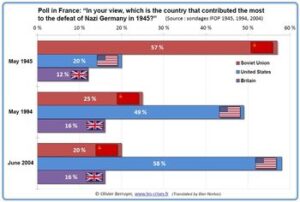Can we rejoice at the end of one war while another is raging? Writing about 8 May is difficult this year. Obviously its most important message must be: Stop the killing in Ukraine! Return to the negotiating table!
 A peculiar stance on the commemoration of the end of the war was adoptedby the German authorities: in Berlin they forbade displaying the Soviet flag in the vicinity of monuments for the Soviet soldiers. But the flag of the Russian Federation, whose president ordered the war against Ukraine in violation of international law, is not the same as that of the Soviet Union, whose army liberated Ukraine and Europe from fascism.
A peculiar stance on the commemoration of the end of the war was adoptedby the German authorities: in Berlin they forbade displaying the Soviet flag in the vicinity of monuments for the Soviet soldiers. But the flag of the Russian Federation, whose president ordered the war against Ukraine in violation of international law, is not the same as that of the Soviet Union, whose army liberated Ukraine and Europe from fascism.
Scholars of antiquity call this damnatio memoriae, the erasure of a ruler’s memory from documents and artifacts, first practiced with the Egyptian pharaoh Hatshepsut (14th century B.C.).
We should see things in proportion: The anti-fascist prestige of the Soviet Union is being distorted by the Russian Federation’s unlawful war of aggression against Ukraine. Putin has claimed to be waging war to ‘denazify’ Ukraine. Who can believe him, while himself providing financial, media, and political support to far-right parties across the continent? Putin’s justification is an insult to all antifascists!
However, the hatred of everything Russian fomented by the conservative and liberal mass media, is more than the response to the Russian aggression. It is directed not only against the oligarchs and politicians who can be accused of responsibility for it, but also against artists, athletes, and scientists, and goes far beyond the goal of justified condemnation of the war. In it, the same anti-Russian resentment has surfaced that has characterised the political cultures of Western elites for more than 100 years.
However, the phenomenon has not been limited to the elites. The fierce criticism by traditional militarist organizations of veterans and the conservative media of the exhibition on the crimes of the Wehrmacht in the East shown in Germany and Austria in the 1990s is understandable. For it was in the Wehmacht in the East that almost a whole generation of young Austrian and German men participated in a war in which they necessarily perpetrated or witnessed genocide.
Listening to the bellicose, irresponsible speeches of the German foreign minister, I realize to what extent the repressed crimes of the grandfathers condition the hatred of the grandchildren.
Those in the left who had illusions about the imperialist policies of the post-Soviet Russian Federation ought to review their perspective on Russia. But they should not forget that every utterance about the other also contains a perspective on oneself.
Every war is a complex phenomenon. Putin’s political crime is that he wanted to smash this complexity by sheer military force. However, through war he has, rather than solving a problem, only created new ones, also for his own state.
On the other hand, the US – through excessive arms deliveries and a new expansion of NATO – now wants to use the tragic situation to involve Russia in a long war to eliminate it as an international player. However, the prolongation of the war will not solve any of Europe’s problems, it will cost thousands of lives and bring Europe to the brink of nuclear war. This may not be a relevant problem from Washington’s point of view, but it is from the point of view of Berlin, Paris, Brussels, or Vienna.
Militarists can argue endlessly about how a war started; pacifists care about how to end it.
Material values can be restored. But every war dead, every war invalid, and every family torn apart will embitter the coexistence of people in this historic region of Europe for decades to come. This war is not about the enmity between the Russian and Ukrainian peoples, but about artificially incited nationalisms that have made Ukraine the theatre of geopolitical and imperialistic rivalry between the US and Russia.
When the war is over, the Ukrainian people will still be there and still not submit. However, they must solve the social and political problems, for which peace is needed above all. Thus, Russia will have to recognise its right to an independent and self-determined state, just as Ukraine will have to accept Russia’s right to a secure demilitarised border. The best solution to this situation is a militarily neutral Ukraine, which recognises the right to the national-cultural autonomy of the ethnic minorities living within its borders.
Never again war! Never again fascism! This is the legacy of the victims in the concentration camps, of the partisans, the resistance fighters, and the members of the allied armies who gave their lives in the fight for liberation.
It commits those of us living today to friendship among nations and to a policy that seeks a way out of the most difficult problems through dialogue, renunciation of violence, and disarmament.
Read here transform! europe’s Peace Manifesto.